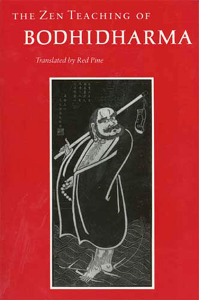Bodhidharma and His Zen Teaching
Bodhidharma holds a special place in my heart.
I stumbled upon an excerpt from “The Zen Teaching of Bodhidharma” by chance, and the following lines jolted me awake from a deep sleep:
If, as in a dream, you see a light brighter than the sun, your remaining attachments will suddenly come to an end and the nature of reality will be revealed. Such an occurrence serves as the basis for enlightenment. But this is something only you know. You can’t explain it to others.
Or if, while you’re walking, standing, sitting, or lying in a quiet grove, you see a light, regardless of whether it’s bright or dim, don’t tell others and don’t focus on it. It’s the light of your own nature.
Or if, while you’re walking, standing, sitting, or lying in the stillness and darkness of night, everything appears as though in daylight, don’t be startled. It’s your own mind about to reveal itself.
Or if, while you’re dreaming at night, you see the moon and stars in all their clarity, it means the workings of your mind are about to end. But don’t tell others. And if your dreams aren’t clear, as if you were walking in the dark, it’s because your mind is masked by cares. This too is something only you know.
If you see your nature, you don’t need to read sutras or invoke buddhas. Erudition and knowledge are not only useless but also cloud your awareness. Doctrines are only for pointing to the mind. Once you see your mind, why pay attention to doctrines?
I repeatedly witnessed the lights and initially suspected a problem with my vision. However, upon reading the aforementioned paragraphs, I embarked on translating the book next day. These lines stand as one of the most cherished gifts I have received in this lifetime, and I extend my heartfelt gratitude to my dear Taiji teacher László for sharing them with me. Thank you once again, László.
While Bodhidharma never penned down his teachings, as was the case with many enlightened beings, tradition attributes three books to him. Scholars argue that since there is no contradictory evidence and these works have been attributed to Bodhidharma for nearly a millennium, there’s no reason to dispute their authenticity. Personally, I believe that Bodhidharma must have conveyed fragments of these teachings, although they were transcribed by his disciples. In ancient tradition, when a disciple takes notes from the master, they refrain from using their names, as everything belongs to the master.
Prajnatara, Bodhidharma’s master, directed him to travel to China due to the significant impact the people there had made, despite lacking enlightenment. These scholars were disciplined, loving, peaceful, and compassionate but had not attained enlightenment. Bodhidharma stands out as the first enlightened individual to reach China, second only to Gautama Buddha, among all enlightened Buddhist figures.
Who is Bodhidharma?
Bodhidharma, also known as “Da Mo” in China and “Tamo” in Japan, was an Indian monk credited with bringing Zen Buddhism teachings to China. He founded the Chan School of Buddhism, which later became known as Zen in Japan.
Born somewhere in Asia, there are innumerous suggestions to where he was born. It is said that Bodhidharma renounced his royal heritage as a prince to become a Buddhist monk. Under the tutelage of the renowned Buddhist, Prajnatara, he traveled extensively throughout India, propagating the teachings of Buddhism.
Legend has it that Bodhidharma journeyed to China during the Liang Dynasty (502-557 CE) and arrived at the Shaolin Temple in Henan Province. Spending nine years meditating in a cave near the temple, he developed a system of physical and mental training known as “Chan” or “Zen,” aiming to enhance monks’ physical health, mental focus, and spiritual awareness. The famous Yi Jin Jing Qi Gong form is attributed to Bodhidharma.
Moreover, Bodhidharma introduced a new interpretation of Buddhist scripture, emphasizing direct enlightenment experience over doctrinal study. He advocated meditation and contemplation as paths to enlightenment. Bodhidharma’s teachings significantly influenced the development of Zen Buddhism in China and Japan, marking him as a pivotal figure in transmitting Buddhism from India to China. He is venerated as a saint in both countries.
What is Chan Buddhism?
Chan Buddhism, or Zen in Japan, originated in China under Bodhidharma’s influence. It prioritizes meditation and direct experience over doctrinal study, aiming to cultivate wisdom and compassion for enlightenment. While Chan shares similarities with other Buddhist traditions, it stands out for its emphasis on direct experience, meditation, and the integration of practice into daily life. It utilizes paradoxical language to transcend intellectual understanding, focusing on the direct realization of truth.
Bodhidharma’s significance lies in his founding of Chan Buddhism, transmitting Buddhist teachings to China, his association with the Shaolin Temple, and his emphasis on direct enlightenment experience and meditation. His teachings continue to inspire practitioners worldwide and have left an indelible mark on Buddhist philosophy and practice.

